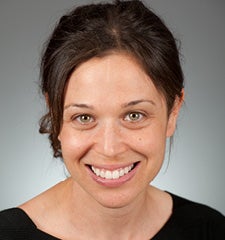Leadership
GRASP Faculty
Director: Steve Freedman, MD, PhD
Advisor: Elizabeth (Lisa) Samelson, PhD
Advisor: Patrizia Vannini, PhD
GRASP Work Plan Mentors
 Iman Aganj, PhD
Iman Aganj, PhD
Iman Aganj is an assistant professor of radiology at Harvard Medical School and an associate investigator at the Athinoula A. Martinos Center for Biomedical Imaging, where he focuses on innovating new imaging analysis techniques to advance human health. His research objectives are focused on developing these techniques and improving existing ones so that researchers and clinicians extract the maximum amount of useful information from the images. This ranges from deriving mathematical formulae via signal processing approaches, to designing robust algorithms and machine learning.
Aganj has been a principal investigator on an NIH/NIDDK K01 career award, an NIH/NIA R56/RF1 research grant, a BrightFocus Foundation grant, a Massachusetts ADRC pilot award, and several computational resource grants. He joined GRASP as a participant in 2016 and became a work plan mentor in 2019 after receiving an R01. He received his BSc in computer science from Ecole Polytechnique (Paris), and his PhD in electrical engineering, with a focus on biomedical image analysis, from the University of Minnesota.
 Christopher Celano, MD
Christopher Celano, MD
Christopher Celano is an attending psychiatrist and clinical researcher at Massachusetts General Hospital, where he is also associate director of the Cardiac Psychiatry Research Program. He serves as the associate editor of General Hospital Psychiatry. Celano joined GRASP as a participant in 2015 and became a GRASP work plan mentor in 2019 after receiving an R01.
Celano’s research focuses on the promotion of wellbeing and health behavior adherence in patients with cardiovascular disease, diabetes, and other chronic conditions. He is also working on research related to the use of collaborative care interventions in patients with acute medical illness. He completed a K23-funded project to develop a positive psychology (PP)-and motivational intervention using interviewing to promote adherence in heart failure, and he currently is conducting a randomized, controlled trial of the program in an R01-funded project. Celano has served as principal investigator and co-investigator of multiple trials of PP-based interventions in individuals with medical or psychiatric illness, and he is the author of more than 80 articles and book chapters.

Brittany Charlton, ScD
Brittany Charlton is an assistant professor at Harvard Medical School in the Department of Population Medicine and at the Harvard T.H. Chan School of Public Health in the Department of Epidemiology. She is also the co-director of the Harvard SOGIE (Sexual Orientation and Gender Identity and Expression) Health Equity Research Collaborative. Charlton joined GRASP as a participant in 2017 and became a GRASP work plan mentor in 2019 after receiving an R01.
Charlton is a leading scholar who documents reproductive health disparities that affect sexual and gender minorities. The second focal area of her research is on contraception use and family planning among people of all sexual orientations and gender identities. Her research has sustained continuous funding over the last decade from the NIH and foundations including the American Cancer Society. She has been the principal investigator on 18 grants including her most recent NIH-funded R01 award which focused on sexual orientation-related disparities in obstetrical and perinatal health. Charlton has published more than 50 original research papers, 30 of which she has been a first or senior author on. Charlton founded Harvard’s Postdoctoral Fellowship in LGBTQ Reproductive Health Disparities Research and she has been the primary mentor on NIH-funded career development awards. She received her MSc and ScD from the Harvard T.H. Chan School of Public Health.

Abby Fleisch, MD, MPH
Abby Fleisch is a pediatric endocrinologist at Maine Medical Center, environmental health researcher at Maine Medical Center Research Institute, and an assistant professor of pediatrics at Tufts University School of Medicine. She joined GRASP as a participant in 2015 and became a GRASP work plan mentor in 2019 after receiving an R01. Fleisch’s research is focused on the role of early-life environmental exposures such as air pollution and consumer product chemicals on cardiometabolic health in childhood.
Fleisch is the principal investigator of a K23 Career Development Award and an Outstanding New Environmental Scientist R01 Award, both from the National Institute of Environmental Health Sciences. She was selected as a member of the Society for Pediatric Research in 2015 and received an Endocrine Society Early Career Investigator Award in 2016. She received her undergraduate and medical degrees from Northwestern University, completed a residency in pediatrics at Boston Children’s Hospital/Boston Medical Center, and did her fellowship in endocrinology at Boston Children’s Hospital. She participated in the Harvard-wide pediatric health services research fellowship and received a MPH from Harvard T.H. Chan School of Public Health.

Sarita Patil, MD
Sarita Patil established her laboratory at the Center for Immunological and Inflammatory Diseases at Massachusetts General Hospital (MGH) in 2018 with a focus on elucidating the allergen-specific humoral response in food allergy. Using allergen-specific B cell multimers, single cell sequencing, recombinant antibodies, and proteomics, her lab works on understanding the mechanisms of antibody- based tolerance in allergen immunotherapy and modulation of effector cell responses. As a translational researcher in food allergy, she is involved in clinical trials for food allergy, both at MGH and through the Immune Tolerance Network (ITN). She established the Multidisciplinary Adult Eosinophilic Esophagitis clinic in 2013 which she continues to administer.
Patil joined GRASP as a participant in 2015 and became a GRASP work plan mentor in 2019 after receiving an R01. She received her undergraduate degree with honors at Stanford University, her medical degree from Duke University School of Medicine, and completed an internal medicine residency at University of Pennsylvania and an allergy and immunology fellowship at MGH. She joined the laboratory of Wayne Shreffler for her postdoctoral laboratory training, along with co-mentorship by Chris Love at Massachusetts Institute of Technology.

Christine B. Sieberg, PhD, EdM, MA
View Christine Sieberg’s bio.
GRASP Administrative Team
Education Program Senior Coordinator: Katie Rumizen

